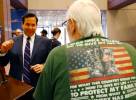Mother’s nonprofit helps veterans transition to civilian life
Summerlin resident Eva Secchiari saw the changes in her son even before his deployment to the Middle East was over. When they Skyped, if she tried to suggest that he do something, he reacted negatively.
“As a mother, you know when there’s something not right with your child,” she said. “Just his behavior. My fear was … I didn’t know what to do. My immediate response was to rescue him, to try to help him out. I knew that’s not where he wanted me to be, so in a sense, I felt helpless.”
She said all she could do was listen.
Her son, whose name she asked not be used, returned in May 2012. She noticed how he was hyper-vigilant, suspicious and always looking over his shoulder.
“He had been in a very ‘hot’ combat zone,” she said, using a military term for an area where fighting was heavy. “Very hot.”
Secchiari, a Navy brat and a life coach, said she knew similar reactions were being experienced by other veterans but that seeing it in her own child, her only child, caused her to step up and do something.
The result was a nonprofit organization, Life After Active Duty. It had begun to take form in her mind during the time they video-chatted and was formally established in October 2012. Now, it is looking to start a pilot program where veterans can find the help they need.
On Aug. 29, Secchiari hosted a forum at the West Charleston Library to introduce veterans to the group, which focuses on post-traumatic stress disorder and those returning from Iraq and Afghanistan.
Life After Active Duty involves an eight-week immersion program where veterans learn coping skills, managing and building resilience to stress or other challenges, personal development and how to be effective personally and gain enhanced leadership skills. The second half includes a thorough assessment and then placement and retention.
The group steers veterans to those who can best address their particular needs.
“There are wonderful services out here, and I’m bringing them all under one umbrella so they don’t need to go different places for help,” Secchiari said.
Involving the soldier’s family in the process is a key element, she said, “because you can’t help a veteran return home without helping the family because they’re dealing with it, too. So, that’s very important, that we include the whole family. You’re rebuilding those relationships that were disconnected while they were in the war.”
There is no cost to the veterans, she said. Support comes from grants and donations.
Built on a collaborative platform, the group works with agencies and companies already in place. Music 4 Life, 2975 S. Rainbow Blvd., for example, has agreed to host the eight-week program. It is currently hosting workshops there as the nonprofit program launches.
Different issues can be addressed with different types of music therapy, said Judith Pinkerton, founder of Music 4 Life.
“There is significant data out here, growing appreciation for music therapy with veterans,” she said. “In fact, the National Endowment for the Arts just funded a three-year position at the Walter Reed (National Military Medical Center in Bethesda, Md.) hospital for a music therapist to work with veterans.”
Nathan Atkins is on the board of Life After Active Duty. He spent eight years in the Army and was in the Panama invasion, Desert Shield and Desert Storm. He said Secchiari’s passion for her son’s well-being immediately caught his attention, and that’s why he agreed to serve on the board.
“This woman’s going to make a change, do something positive,” he said.
What, in a nutshell, would he tell a veteran?
“To be proud of their service,” Atkins said. “In a lot of ways, I don’t think they are. We never really cared much for military life. Most of us talked about what we would do when we got out, we’d get a degree, get a job and make real money. They’d talk about the things they were going to do in life and that this was just the ‘thing’ that would lead to what was better. … In reality, the military is a real job.”
Secchiari plans to expand from 30 participants to 60. Her own profession, she said, made it possible for her to set up the organization so it was optimally effective.
“When you can figure out where people are at, it makes it a lot easier to help people and (understand) what’s going on with them, especially if they’re stuck,” she said.
The pilot program is set to launch Dec. 5. It is currently in the fundraising phase.
What’s Secchiari’s vision for the future?
“I see it going beyond Nevada,” she said. “I see it going nationwide. The focus is here, we have 330,000 veterans here, so if we start building that foundation, working with our veterans here, then we can start expanding outside the state of Nevada. It needs to happen.”
For more information, visit lifeafter activeduty.org.
Contact Summerlin/Summerlin South View reporter Jan Hogan at jhogan@viewnews.com or 702-387-2949.






















